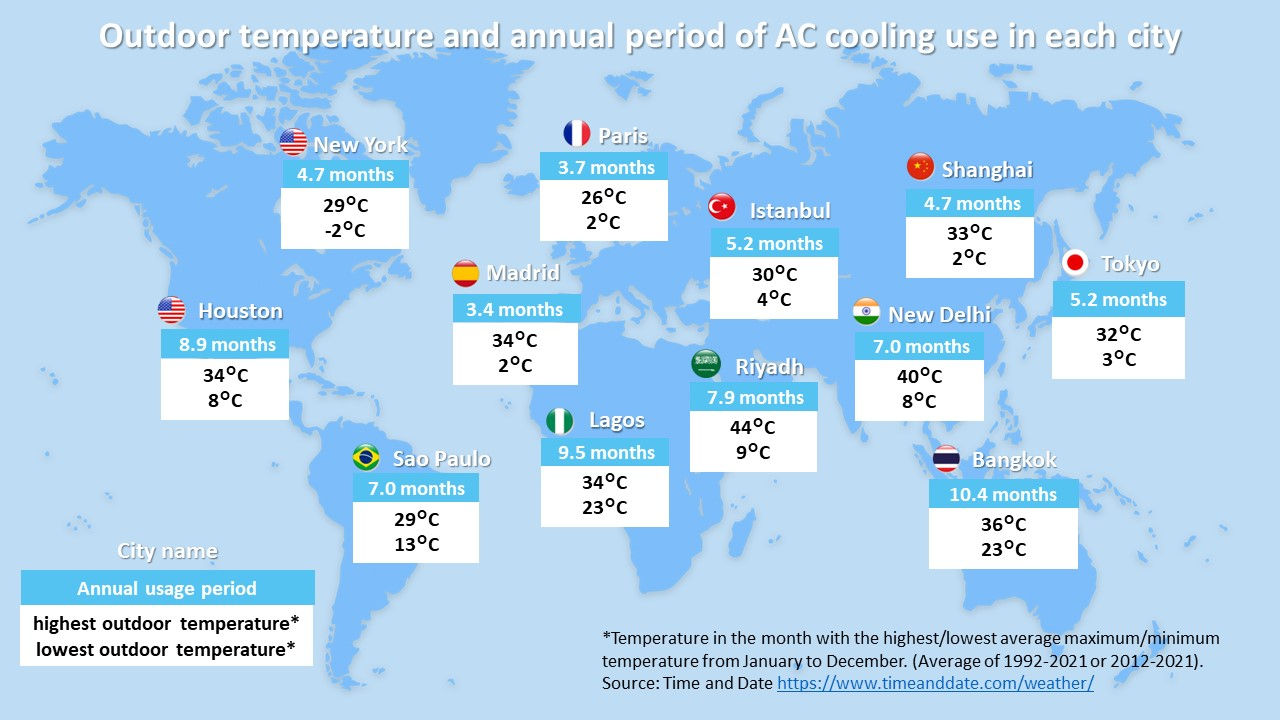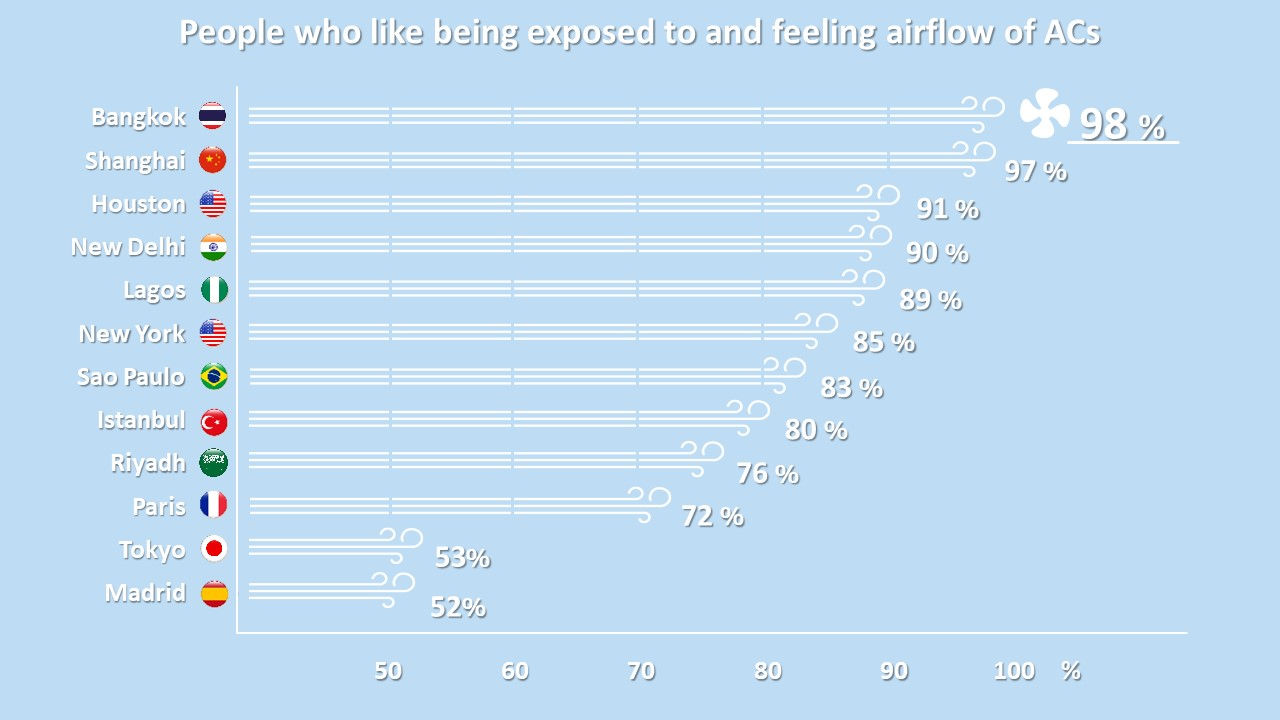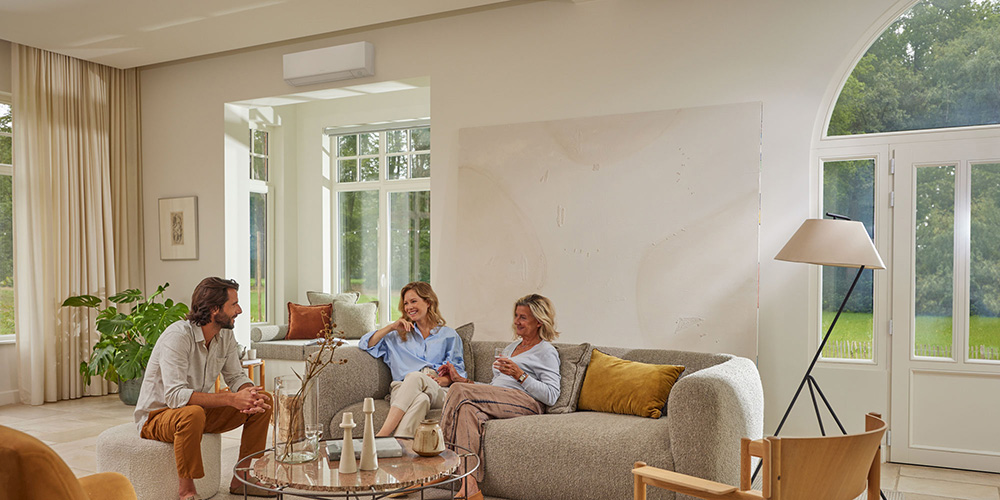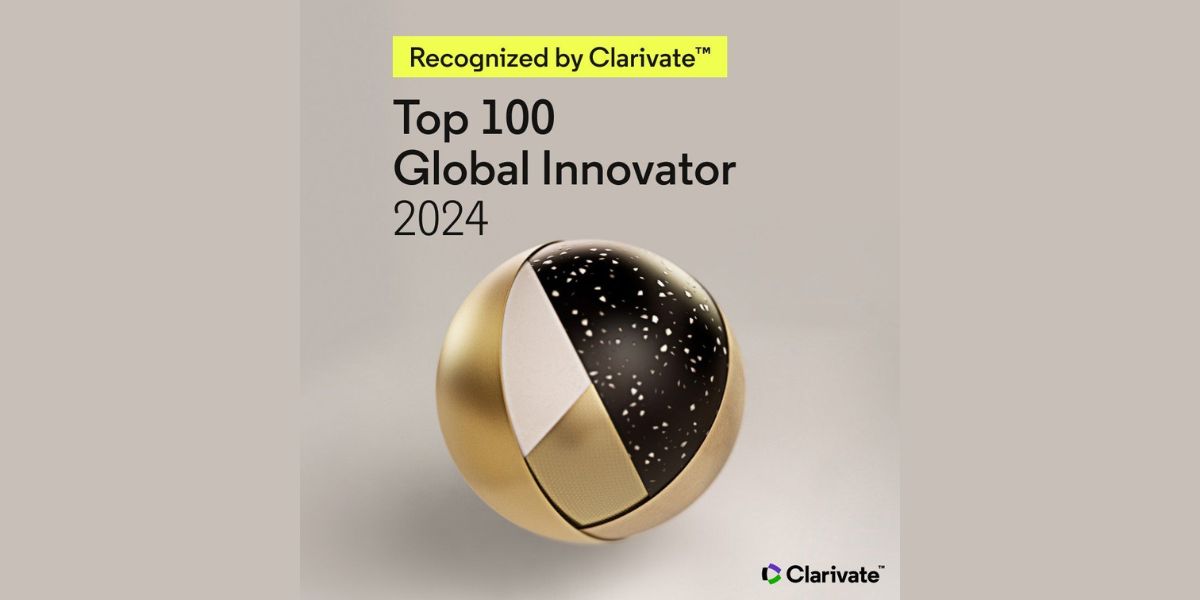
Brussels, August 2024 – Daikin Industries, Ltd., the parent company of Daikin Europe N.V., conducted the Daikin World Air Survey, involving 1,200 participants from 12 cities worldwide. The survey aimed to explore attitudes and usage patterns of air conditioning in homes. Daikin, an HVAC-R manufacturer present in 175 countries and regions is celebrating its 100th anniversary this year. The survey was designed to enhance global awareness of air conditioning and air quality by identifying and comparing attitudes and usage across various cities around the globe.

The key findings of the survey
- Lagos had the lowest average set temperature for AC cooling at 21.9°C, while Tokyo had the highest at 26.2°C, a difference of 4.3°C.
- In Riyadh, the temperature difference between the AC setting and the maximum outdoor temperature reaches up to 20.6°C. During the hottest month, residents use AC for an average of 14.9 hours per day.
- Lagos has the second-longest annual AC usage at 9.5 months. Madrid experiences the shortest usage at 3.4 months, with Paris close behind at 3.7 months.
- Madrid recorded the lowest percentage of people who like being exposed to and feeling the airflow of AC during the hottest months, at 52% among the 12 cities surveyed.
- Energy efficiency is the primary choice criterion when purchasing an AC in 11 out of 12 cities. A relatively high proportion of respondents in New York, Istanbul, Paris and Madrid cited ‘a desire to reduce environmental impact’ as a key reason for prioritizing ‘energy efficiency’.
Lagos had the lowest average set temperature for AC cooling at 21.9°C, while Tokyo had the highest at 26.2°C, a difference of 4.3°C.
Temperature setting showed a marked difference between the cities in terms of AC cooling usage.
Respondents were asked about the temperature they most commonly set their home air conditioner to during the hottest month of the year, and the average temperature setting*1 for each city was then calculated. The results showed that the lowest average temperature setting was 21.9°C in Lagos and the highest was 26.2°C in Tokyo, with a difference of 4.3°C. Temperature perception is known to vary based on one’s country of origin and individual physical constitution. In Lagos, São Paulo and New York, many people appear to find lower temperatures more comfortable.
On the other hand, the average temperature settings in Tokyo, Bangkok and Shanghai in Asia were higher than in other cities (Tokyo: 26.2°C, Bangkok: 25.1°C, Shanghai: 25.0°C). Many people in Asia may be more sensitive to cold or may avoid setting the temperature too low to enhance energy efficiency.
*1 Average of the temperature most commonly set for residential AC cooling during the hottest month of the year. Responses of ‘18°C or lower’ were calculated as 18°C, while ‘30°C or higher’ were calculated as 30°C. Responses stating ‘automatic’ settings were excluded from the calculations.

In Riyadh, the temperature difference between the AC setting and the maximum outdoor temperature reaches up to 20.6°C. During the hottest month, residents use AC for an average of 14.9 hours per day.
When studying the difference between the average maximum outdoor temperature*2 and the average set temperature*1 for AC during the hottest month in each city, the largest difference was found in Riyadh at 20.6°C (average maximum outdoor temperature: 44.0°C, average set temperature for AC: 23.4°C). Lagos was also found to have the third largest temperature difference, with a 12.1°C variation (average maximum outdoor temperature 34.0°C and an average AC setting of 21.9°C).
Furthermore, when asked about the average time spent using AC at home all day during the hottest month of the year*3, Riyadh was found to use air conditioning for 14.9 hours, the second longest time after Houston. On the other hand, Madrid had the shortest usage time with 5.6 hours, Paris had the second shortest with 6.3 hours and Istanbul was third with 6.8 hours.
In Riyadh, air conditioning systems face significant demands due to the extreme differences between outdoor temperatures and AC settings, as well as the long daily usage during the hottest time of the year. Fortunately, Daikin air conditioners are engineered to handle the specific needs of each region, so they perform well even in the high temperatures of Riyadh.
*1 Average of the temperature most commonly set for residential AC cooling during the hottest month of the year. Responses of ‘18°C or lower’ were calculated as 18°C, while ‘30°C or higher’ were calculated as 30°C. Responses stating ‘automatic’ settings were excluded from the calculations.
*2 Temperature in the month with the highest average maximum temperature from January to December. (Average of 1992-2021 or 2012-2021). Source: Time and Date https://www.timeanddate.com/weather/
*3 Average hours of AC cooling use per day when spending all day at home during the hottest month of the year. Calculated as 1.5 hours for responses of ‘1-2 hours’, 3.5 hours for ‘3-4 hours’, 5.5 hours for ‘5-6 hours’, 8.5 hours for ‘7-10 hours’, 13 hours for ‘11-15 hours’, 19.5 hours for ‘16-under 24 hours’ and 24 hours for ‘24 hours’.

Lagos has the second-longest annual AC usage at 9.5 months. Madrid experiences the shortest usage at 3.4 months, with Paris close behind at 3.7 months.
When asked "How many months of the year do you use AC cooling?", Bangkok had the longest average of 10.4 months, followed by Lagos with 9.5 months. These two cities have climates that feel hot all year round, with an average minimum outdoor temperature*4 of over 20°C, even in the coolest months. AC cooling seems to be a year-round necessity in these areas.
On the other hand, the shortest period of use was 3.4 months in Madrid, followed by 3.7 months in Paris. In Europe, AC cooling seems to be used only in the summer in many cases.
*4 Temperature in the month with the lowest average minimum temperature from January to December. (Average of 1992-2021 or 2012-2021). Source: Time and Date https://www.timeanddate.com/weather/

Madrid recorded the lowest proportion of people who like being exposed to and feeling the airflow of air conditioners during the hottest months, at 52% among the 12 cities surveyed.
When asked about their opinion about feeling the airflow of air conditioners on their skin during hot weather, most people in most cities responded positively saying they “strongly like it” or “somewhat like it”. However, in Madrid and Tokyo, opinions were more mixed. In these cities, nearly half of the respondents liked the airflow, while the other did not, showing a clear division in preferences.

Energy efficiency is the primary choice criterion when purchasing an AC in 11 out of 12 cities. A relatively high proportion of respondents in New York, Istanbul, Paris and Madrid cited a ‘desire to reduce environmental impact’ as a key reason for prioritising ‘energy efficiency’.
When asked what they consider important when buying an AC, energy efficiency was the most important factor in 11 out of 12 cities*5.

When respondents who prioritised energy efficiency when purchasing an air conditioner were asked for their reasons, the predominant motivation across all cities was reducing their electricity bill, rather than minimising environmental impact. A total of 72% of respondents from all 12 cities cited reducing their electricity bill as their primary reason.
New York had the highest percentage of people who prioritised energy efficiency mainly for the purpose of "reducing environmental impact", at 45.2%. Paris, Madrid, and Istanbul also had relatively high percentages, with each city seeing over 30% of respondents citing "reducing environmental impact" as the key reason.
*5 Respondents were asked to rank the most important factors when purchasing an air conditioner from 1 to 3. The rankings were then weighted, with the first choice receiving 3 points, the second choice 2 points, and the third choice 1 point, to calculate a weighted average.

Survey summary
Research entity: Daikin Industries, Ltd.
Method of survey: internet-based questionnaire
Survey population: 100 people aged between 20 and 70 in each city / who have AC at home
Target cities and survey period:
Bangkok, Thailand / 24 May - 29 May 2024
Houston, USA / 24 May - 6 June 2024
Istanbul, Turkey / 30 May - 31 May 2024
Lagos, Nigeria / 24 May - 29 May 2024
Madrid, Spain / 24 May - 29 May 2024
New Delhi, India / 24 May - 30 May 2024
New York, USA / 24 May - 6 June 2024
Paris, France / 28 May - 29 May 2024
Riyadh, Saudi Arabia / 31 May - 5 June 2024
Sao Paulo, Brazil / 24 May - 29 May 2024
Shanghai, China / 24 May - 6 June 2024
Tokyo, Japan / 10 May - 21 May 2024
Copyrights pictures: Daikin Industries Ltd.
About
Daikin Industries Ltd.
Daikin Industries is a worldwide leader in heat pump, air conditioning, and air filtration technology with more than 98,000 employees. Founded in Osaka in 1924, it is the only manufacturer in the world that develops and manufactures HVAC-R equipment, as well as compressors and refrigerants in-house. Daikin was named one of the world’s top 100 most innovative companies by Clarivate (UK) and LexisNexis (USA), recognized for its leadership in technology research and intellectual property patents. For its fiscal year 2023 Daikin reported a record sales result of € 28 billion sales (1 April 2023 – 31 March 2024).
Read more on www.daikin.com.
Daikin Europe N.V.
The Daikin Europe group is a leading provider of heating, cooling, ventilation, air purification and refrigeration (HVAC-R) technology in Europe, Middle East, and Africa. Daikin designs, manufactures, and offers customers a broad portfolio of products, maintenance services as well as turnkey solutions for residential, commercial, and industrial purposes. To date, Daikin Europe has over 13,800 employees across more than 59 subsidiaries. It has 14 manufacturing sites in Belgium, the Czech Republic, Germany, Italy, Spain, Austria, the United Kingdom, Turkey, the United Arab Emirates, and the Kingdom of Saudi Arabia. Headquartered in Ostend (Belgium) for over 50 years, the Daikin Europe group is a subsidiary of the global group Daikin Industries.
Read more on www.daikin.eu
Daikin Airconditioning Central Europe
Daikin Airconditioning Central Europe was founded in 1999 with its headquarters in Vienna, Austria, as a subsidiary of Daikin Europe. Its portfolio comprises products and total solutions for heating, cooling, ventilation, air purification, and refrigeration needs in residential, commercial, and industrial settings. More than 700 employees and 3,400 partners are responsible for sales and service activities in 16 countries in Central and Eastern Europe, including Austria, Albania, Bosnia and Herzegovina, Bulgaria, Croatia, the Czech Republic, Hungary, Kosovo, Montenegro, Moldova, North Macedonia, Poland, Romania, Serbia, Slovakia, and Slovenia.
With "Your Daikin World" at the Vienna headquarters, and the “Daikin Inspiration Park” the HVAC-R industry and the construction sector have access to two modern B2B-experience centers for co-creating tailor-made solutions for hotels, retail, offices, and large commercial applications. Across the CE-region Daikin runs 10 out of 116 B2B-trainings centers across Europe. Consumers and homeowners receive consulting in four B2C-Experience centers in Vienna, Belgrad, Bratislava and Budapest.
Read more on www.daikin-ce.com
Media contact
Daikin Central Europe
Daikin Airconditioning Central Europe HandelsgmbH
Lemböckgasse 59/1/1, 1230 Vienna, Austria
Doris Passler, Manager Corporate Communications Central Europe – Phone: +43 (0) 664 24 56 444, Mail: passler.d@daikin.at
Daikin Europe N. V.
Sofie Sap – Phone: +32 472 580482, Mail: sap.s@daikineurope.com
Daisuke Kakinaga – Phone: +32 465 462321, Mail: kakinaga.d@bxl.daikineurope.com
-
 Press release Daikin World Air Survey 2024PDF | 860.16KB
Press release Daikin World Air Survey 2024PDF | 860.16KB -
 Daikin World Air Survey InfographicsPDF | 1.91MB
Daikin World Air Survey InfographicsPDF | 1.91MB




